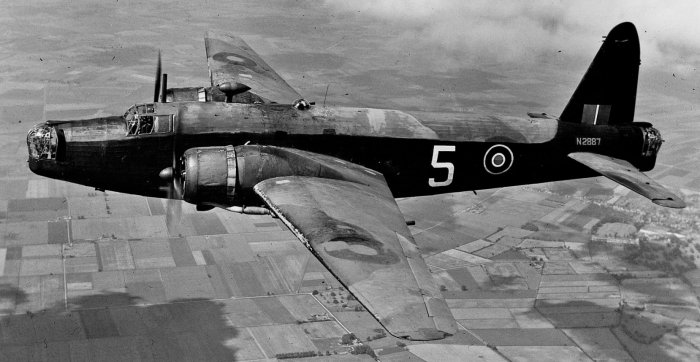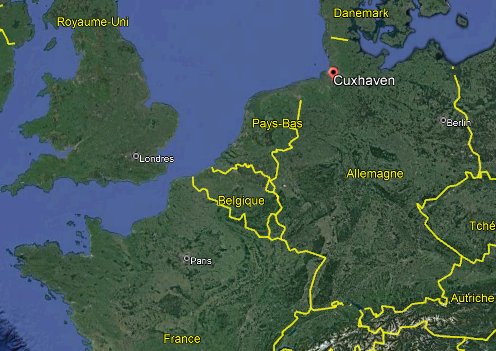ACUFO-1940-03-23-CUXHAVEN-1
In the 2020's, author Graeme Rendall, in an article published on the blog The Debrief, wrote about the Foo-Fighters reported by R.A.F. pilots during WWII.
Among the cases he wrote about, he published a scan of an R.A.F. report he said to be dated 1940, which indicates that on the night of March 23 to 24th, a Wellington night bomber “near Cuxhaven was shadowed by an unidentified aircraft which was reported to be using a form of searchlight.” This aircraft “maintained position about 2,500 yards astern and 450 to starboard of our aircraft. The light did not appear to be capable of swiveling and the aircraft was at too great a distance for further details to be obtained.”
| Date: | March 23-24, 1940 |
|---|---|
| Time: | Night. |
| Duration: | ? |
| First known report date: | 1940 |
| Reporting delay: | Hours, months. |
| Country: | Germany |
|---|---|
| State/Department: | Lower Saxony (Niedersachsen) |
| City or place: | Cuxhaven |
| Number of alleged witnesses: | ? |
|---|---|
| Number of known witnesses: | 0 |
| Number of named witnesses: | 0 |
| Reporting channel: | R.A.F. report in 1940. |
|---|---|
| Visibility conditions: | Night. |
| UFO observed: | Yes. |
| UFO arrival observed: | ? |
| UFO departure observed: | ? |
| UFO action: | None. |
| Witnesses action: | None. |
| Photographs: | No. |
| Sketch(s) by witness(es): | No. |
| Sketch(es) approved by witness(es): | No. |
| Witness(es) feelings: | ? |
| Witnesses interpretation: | Enemy aircraft with searchlight. |
| Sensors: |
[X] Visual: 1 or more.
[ ] Airborne radar: N/A. [ ] Directional ground radar: N/A. [ ] Height finder ground radar: N/A. [ ] Photo: [ ] Film/video: [ ] EM Effects: [ ] Failures: [ ] Damages: |
|---|---|
| Hynek: | NL |
| Armed / unarmed: | Armed, 7.62 machine guns. |
| Reliability 1-3: | 2 |
| Strangeness 1-3: | 1 |
| ACUFO: | Insufficient information, possible meteor. |
[Ref. grl1:] GRAEME RENDALL:

|
[Transcript of the above scan:]
(a) on the night of 23rd/24th March, a Wellington near Cuxhaven was shadowed by an unidentified aircraft which was reported to be using a form of searchlight. This aircraft maintained position about 2,500 yards astern and 450 to starboard of our aircraft. The light did not appear to be capable of swivelling and the aircraft was at too great a distance for further details to be obtained.
An extract from a 1940 report detailing “unidentified aircraft” carrying “searchlights”. The Germans did not experiment with such devices and therefore the exact nature of whatever was following the bombers concerned is unknown.
What these bomber crews were seeing and reporting back in World War 2 is unknown. The Luftwaffe never deployed air-to-air mortars or missiles for use at night. They did attempt to develop various surface-to-air missiles but none ever became operational and they certainly weren't tested over the Balkans in 1944 - or western Europe in the spring of 1940. The first operational German jet fighters were flown at night in December 1944 but only in very small numbers until the end of the war, being confined to the defence of Berlin. They couldn't have accounted for the dozens of sightings throughout that year - or earlier.
The Vickers-Armstrongs Wellington was a British twin-engined, long-range medium bomber designed during the mid-1930s at Brooklands in Weybridge, Surrey, U-K. The Wellington was used as a night bomber in the early years of the WWII, performing as one of the principal bombers used by Bomber Command.
Its use within the Bomber Command of the R.A.F. started September 1939. It had no airborne radar before late 1944.
For its defense against the German fighter planes, it carried 7.62 mm M1919 Browning machine guns, originally 2 in nose the turret, 2 in the tail turret, 2 in waist positions.

|

|
The problem with this case is the lack of detail in the report. The “searchlight” could have been a meteor, the duration for example could have validated or invalidated this, but it is not reported.
Insufficient information, possible meteor.
* = Source is available to me.
? = Source I am told about but could not get so far. Help needed.
| Main author: | Patrick Gross |
|---|---|
| Contributors: | None |
| Reviewers: | None |
| Editor: | Patrick Gross |
| Version: | Create/changed by: | Date: | Description: |
|---|---|---|---|
| 0.1 | Patrick Gross | September 29, 2023 | Creation, [grl1]. |
| 1.0 | Patrick Gross | September 29, 2023 | First published. |